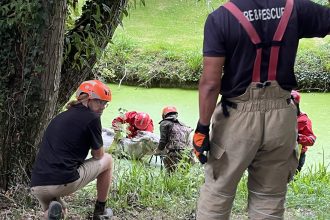A new £1.5m simulator that replicates wind and rain will allow boffins to take the weather into the lab for the first time in Britain.
The new facility can mimic current and future weather patterns around the world and will help researchers learn more about how crop-killing diseases spread.
The simulator will aid research into global food security problems and be available to the international research community.
READ MORE: Brazen woman with balloon in mouth surrounded by gas canisters spotted in parked car
Professor Ivana Gudelj of the University of Exeter said the new facility, which is based there, was one of the few places in the world that could simulate wind, rain and mist all together.

She said: “Environmental conditions, including wind, rain and humidity, play a key role in plant health and disease.
“Field studies allow us to observe plants in their natural conditions, yet these are hard to control, meaning we can struggle to replicate our results, which is crucial to robust science.
“Other classical controllable growth facilities cannot accurately replicate such a diverse range of natural environmental conditions.
“Our cutting-edge new simulator means we can manipulate and generate all kinds of conditions to get a much clearer idea of how our research will really play out in the natural environment.
“The Global Meteorological Simulator fills a gap in UK science capacity, enabling UK researchers working on plant health and disease to undertake truly groundbreaking research.”
The simulator is being used to look at how disease spreads among rice plantations, by simulating tropical conditions such as those found in China or India, as reported by Need To Know.
The GMS will be available to researchers and industry experts beyond the University of Exeter, to help enable access to advanced research equipment and national expertise.
The GMS was funded through a Biotechnology and Biological Sciences Research Council funding scheme.
Dr Tim Shuttleworth, Head of Research Infrastructure at BBSRC, said: “We’re delighted to see this cutting-edge facility begin operation, and we look forward to the interdisciplinary collaborations it will foster and the insights it will deliver into the impacts of climate on plant health and disease.”
Ryan Popilchak, President of Conviron and Argus Controls, which developed the GMS, remarked: “Conviron and Argus are incredibly proud to serve as the technology partner for the University of Exeter on one of our most innovative and unique plant growth facilities anywhere in the world.
“At Conviron and Argus Controls, we deeply value the role of plant science in addressing today’s environmental and food security challenges, and we are excited that these new chambers will help accelerate the discovery process for years to come.”
Professor Lisa Roberts, President and Vice Chancellor of the University of Exeter, said: “Our new Global Meteorological Simulator is a major step forward in the University’s ability to discover how changing conditions will affect plants, and therefore crop production.
“We pride ourselves on our research impact in this field, and we’re firmly committed to leading meaningful action against the climate emergency and ecological crisis.
“This exciting new facility will allow our researchers to identify threats and develop vital solutions to ensure a healthy and sustainable future.”
The Global Meteorological Simulator (GMS) has been funded by the Biotechnology and Biological Sciences Research Council (BBSRC) and the University of Exeter.
READ MORE: Secret room used to stash illegal fags and vapes found by cops behind false door under kitchen SINK










